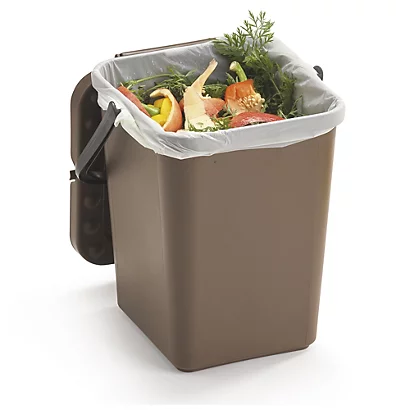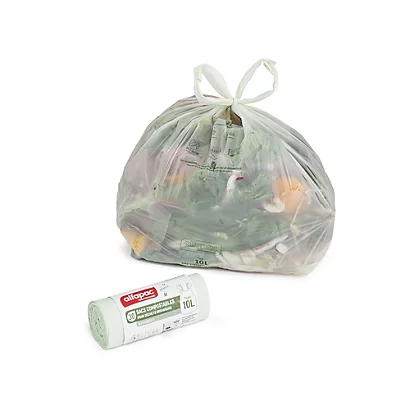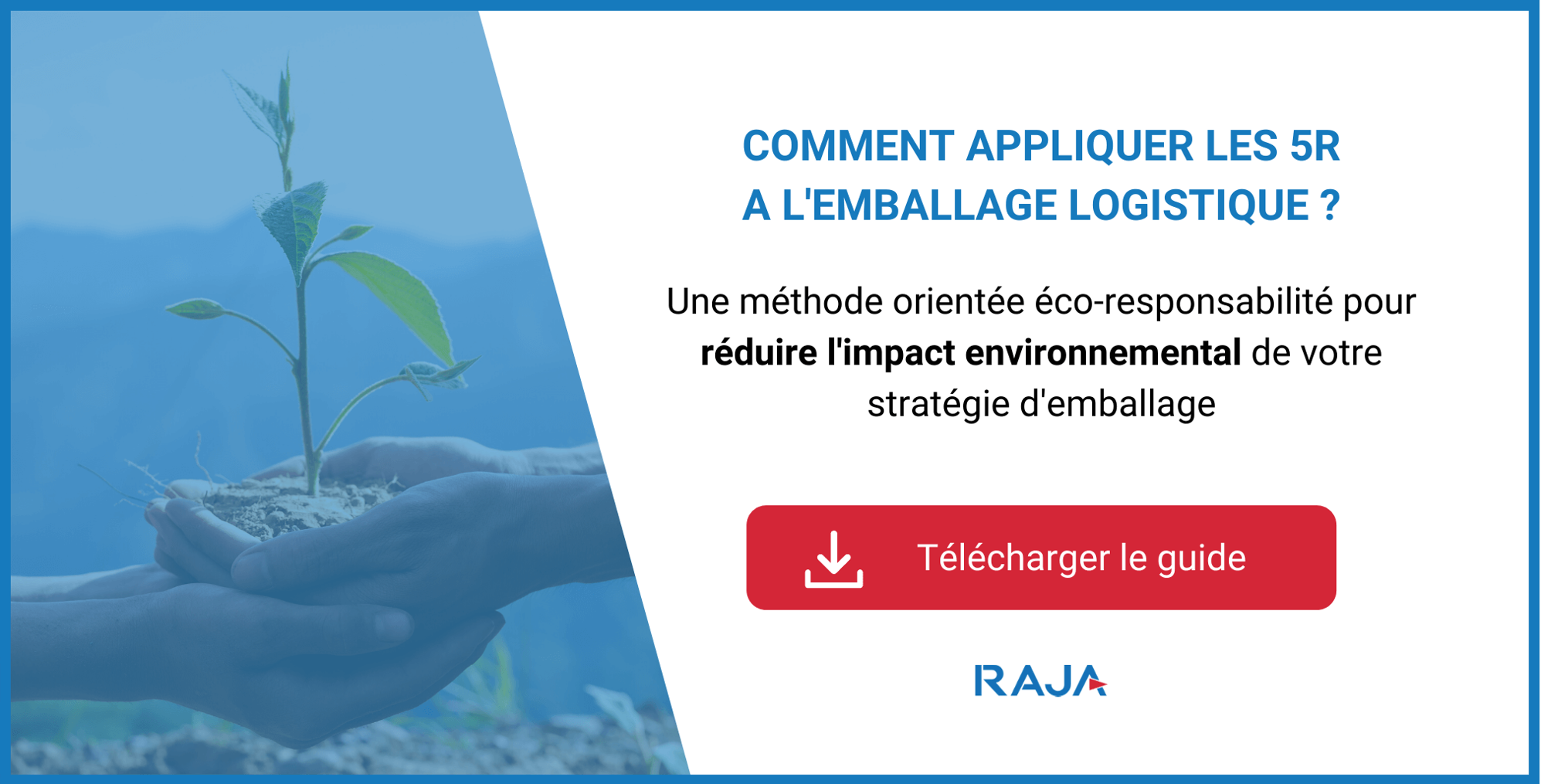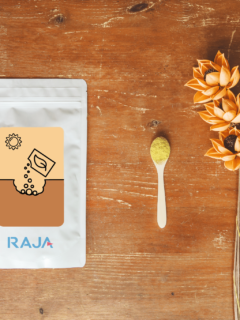Do you know what happens to apple peelings or tree prunings when you put them in the normal household waste bin? They end up buried or incinerated.
And yet this type of bio-waste could be recycled, and used locally, if it were treated in the right way!
Such is the value of this waste that, since the beginning of 2024, the law has required businesses and private individuals alike to take a closer look at it.
In this article, you’ll find out everything you need to know about managing biowaste in the workplace, from the legal framework that requires you to do so to the equipment you need to have at your disposal.
What is bio-waste?
The Environment Code (and in particular article L. 541-1-1) provides the official definition of bio-waste.
It defines it as follows: “Biodegradable non-hazardous garden or park waste, food or kitchen waste from households, offices, restaurants, the wholesale trade, canteens, caterers or retail outlets, as well as comparable waste from food processing plants“.
So there are different types of bio-waste that you, as a business, need to be aware of in order to sort it properly:
- Green waste, such as the remains of grass cuttings, mowings, shrub and hedge prunings, dead leaves and twigs, shrub prunings, etc.
- Food waste such as kitchen waste (leftovers from meals or food preparation, for example).
- Waste from food production failures, products that have expired or are uneaten, or unsold products that can no longer be sold.
Today, this bio-waste still accounts for a third of the residual household waste bins (i.e. unsorted waste) put out by the French.
Yet when it is sorted, it can be used to produce biogas (which is then fed into the natural gas network, or used for local energy consumption), or as an organic fertiliser to improve soil quality for farmers or green space managers.
The AGEC Act: a framework for the management of bio-waste by businesses
If you’re interested in the subject of bio-waste management, it’s not least because the law now requires you to do so.
The AGEC law (also known as the “anti-waste law”), which comes into force in 2020, includes a section on bio-waste management in addition to the sections onenvironmentally-friendly food packaging. This section stipulates thatfrom 1 January 2024, all waste producers in France, whether private households, professionals or local authorities, mustsort bio-waste at source.
So it’s up to you to look after this organic waste.
How can you manage your company’s bio-waste?
You have two options when it comes to managing bio-waste: either use a service provider specialising in the collection of organic waste and its treatment/recovery; or set up a composting process.
Have your bio-waste collected by a specialist service provider
You can choose to use a service provider specialising in the collection and processing of organic waste. This solution is essential if you produce a large volume of bio-waste each month, or if the second option proves too complicated for your organisation.
There are a number of service providers in France who can help you manage your biowaste. Some local authorities already have public collection systems in place; others don’t, so you’ll need to turn to a private player in the sector.
If you choose this solution, make sure you ask yourself :
- Which organisations collect bio-waste in your municipality?
- How often?
- What volume of bio-waste will you have collected by this service provider?
Implementing an in-house composting process
The second option is interesting if you generate a small volume of bio-waste each week: setting up a composting system to recycle your organic waste on site.
This solution allows you to recycle the waste on site, and to limit the energy costs involved in transporting the waste by the lorries of the service providers who come to collect it.
You can then decide to :
- Install a composter in your company, which will enable you to create compost for use in your green spaces or plants. If you have the right resources, you can also use them for methanisation: a technique that involves recovering the biogas that emanates from bio-waste and using it as a local source of energy.
- Use the compost bins available near your business. More and more local authorities are installing communal compost bins for shared composting, for example at the foot of buildings.
If you choose this option for managing bio-waste, make sure you appoint someone in the company to be responsible for composting, the process and monitoring.
How to manage bio-waste in your company and warehouse
Set up a selective waste collection system
You have probably already set up a waste sorting system in your company for the 5 traditional waste streams (paper and cardboard, metal, plastic, glass and wood).
To manage bio-waste, you now need to set up a dedicated collection system for this type of waste, to ensure that it is separated from the other waste streams.
To do this, you need :
 |
Biowaste collectorsBio-waste collectors are an efficient way of collecting organic waste. Available in 10, 45 and 90 litre sizes, depending on your needs. |
 |
Compostable bin bagsCompostable bin liners make it easier to separate your waste. They are ideal for composting your green and organic waste, and meet the requirements of the AGEC law. |
As well as choosing the right sorting equipment, make sure you position your collection bins in strategic locations in your company and warehouse:
- In the kitchen for food waste
- Outside for green biowaste (for your gardeners and landscapers)
- Near quality control and in various places in your foodstorage area
Educate your teams about bio-waste and its management
Once your sorting equipment has been installed, you need to ensure that your bio-waste is collected. To do this, you need to educate your staff about bio-waste and the sorting techniques they need to apply in their day-to-day work.
Use your traditional internal communication channels to publicise your sorting process and your organic recovery options (composting, methanisation, etc).
This awareness-raising process concerns both the teams responsible for maintaining the hygiene of the premises (who need to know the collection frequency schedules of your service providers, for example) and the other employees (who need to be made aware of how to sort waste).
On a larger scale: reduce your quantity of organic waste
Implementing a bio-waste management process is all well and good. But working to reduce the amount of organic waste you produce on a daily basis is even better! This type of work on a wider scale can benefit your CSR strategy.
In particular, you can :
- Manage food stocks on a more just-in-time basis, to avoid unsold or out-of-date food products becoming bio-waste. This technique also enables you to save on storage costs.
- Raise your teams’ awareness of the need to reduce bio-waste during meals (peelings, wastage, etc.), or when cutting up organic materials (such as wood or foodstuffs).
You now hold all the cards for optimal bio-waste management in the workplace: it’s up to you!
















